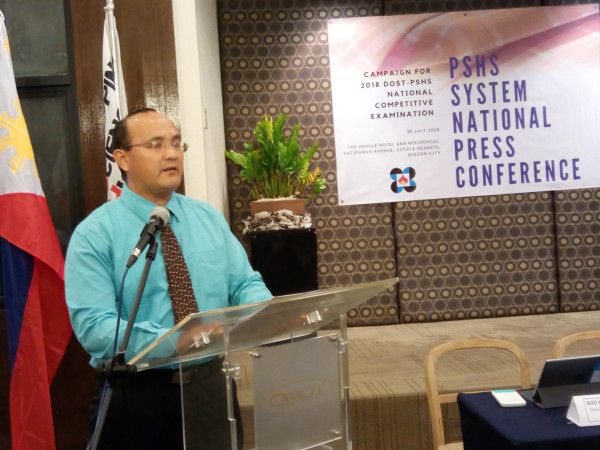
The Philippine Science High School (PSHS) System has called for “Pisay” scholarship applicants, who are Grade 6 elementary pupils for its 2018 National Competitive Examination (NCE).
Applicants who plan to enter high school have until September 14 to apply for the NCE, which is given every year.
Awaiting scholar-awardees, who must enter into a scholarship agreement with PSHS to take a STEM (Science, Technology, Engineering, and Mathematics) course after graduation, are free tuition fee, free loan on textbooks, monthly stipend, and uniform, transportation and living allowances for low-income groups.
Students and their parents may get into legal trouble if they renege on the agreement as the Commission on Audit (COA) 2017 audit report showed former awardees in PSHS campus in Western Visayas and Cordillera Administrative Region (CAR) owe the school some P6.861 million, which they have to pay back for not enrolling after high school graduation in a STEM course.
An earlier COA audit report in 2016 found out that 115 PSHS erstwhile scholars who already graduated owe the PSHS around P18.89 million for violating the agreement or contract.
They graduated from the Ilocos Region Campus; Western Visayas Campus; Central Mindanao Campus; and Southern Mindanao Campus. COA urged the PSHS to go after the agreement-breakers and recover the government money from people’s taxes spent for their secondary education.
Among the STEM courses that graduates must take are Aerospace Engineering, Astronomy, Biochemistry, Biology, Chemical Engineering, Chemistry, Civil Engineering, Computer Science, and others.
To be eligible for the NCE, they must have the criteria for eligibility, the PSHS System said.
They must have a final grade of 85 percent or higher in Science and Mathematics as shown by their Grade 5 Report Card.
If a Report Card shows a below-85 percent rating in the two subjects, then a student will need to prove he/she belongs to the upper 10 percent of the class.
Applicants must also be Filipino citizen and has no pending or approved application as immigrant to any foreign country; have received not lower than a satisfactory ranking (or its equivalent) in his/her Character Rating for Grade 5 Report Card; have not taken the PSHS-NCE in the past; and, preferably, in good health and fit to go through a rigorous academic program.
The NCE is described as an “scholastic aptitude test” that measures Scientific Ability, Quantitative Ability, Abstract Reasoning, and Verbal Aptitude.
PSHS System Deputy Executive Director Dr. Rod Allan A. de Lara said the 16 campuses of the school have at present 8,000 students who are all Pisay scholars.
He said the PSHS System has current budget of P4 billion, adding the government is spending some P200,000 a year for each of the system’s students.
“We have the brightest students in the Philippines,” de Lara said.
Popularly known as “Pisay,” the PSHS is under the Department of Science and Technology (DOST) and many of its students are consistent winners in regional and international mathematics competitions.
And they are also highly inventive, like PSHS Bicol Region Campus alumna Maria Yzabell Angel V. Palma, who invented the environment-friendly AirDisc Air Conditioning Technology she started in 2016 and completed in early 2018.
The PSHS System’s Main Campus is located along Agham Road, Diliman, Quezon City, headed by Executive Director Lilia T. Habacon.
She assured they are all out in supporting their students.
Scattered around the Philippines are its regional campuses in Ilocos Region; Cagayan Valley; CAR; Central Luzon; CALABARZON Region; MIMAROPA Region; Bicol Region: Western Visayas; Central Visayas; Eastern Visayas; Zamboanga Peninsula Region; Central Mindanao; Southern Mindanao; SOCCSKSARGEN Region; and CARAGA Region.
The Philippines’ 17th region, the Autonomous Region in Muslim Mindanao (ARMM), which may soon be replaced by the envisioned Bangsamoro Autonomous Region in Muslim Mindanao (BARMM), is sadly the only one with no PSHS campus as the ARMM Regional Legislative Assembly (RLA) has, apparently, not yet enacted a law for it.
NCE applicants may visit the PSHS System’s website (www.pshs.edu.ph) for more information, where they can also download the NCE application form. PSHS has scheduled the date of the NCE on October 20.
Meanwhile, grantees are well advised to take seriously the scholarship contracts or agreements their parents are going to sign.
It’s because the government — as represented by the DOST — is really serious in implementing the contract. If graduates fail to fulfill the scholarship agreement, meaning they will not enroll in a STEM course, they can very well get into some legal trouble.
And even their parents may get the law’s punitive hand as well.
DOST through its Science Education Institute (SEI) has scholarships for undergraduate and graduate programs that have been ongoing for 60 years.
SEI has scholarships for incoming college students, for master’s degree, and doctorate degree.
Director Josette Biyo, head of DOST-SEI, pointed out during a briefing for media during this year’s National Science and Technology Week (NSTW) the scholarship grants have dramatically grown from 4,000 to 8,994 slots for undergraduates.
She said they want to increase the 20,618 slots in 2016 to 33,256 scholars for 2019.
“For the master’s degree, we increased it from 700 to 1,400 (slots), while for the PhD level, we (increased) it from 250 slots to 700,” she said.
Biyo said there are three scholarship programs for undergraduates, such as the Republic Act (R.A.) 2067 for students with high level of aptitude in science and mathematics; the R.A. 7687 S&T Scholarship geared towards poor and deserving students with their families in the low socioeconomic status (P300,000 earnings a year); and R.A. 10612, which is the Junior Level Science Scholarship Program for college students taking STEM courses.
The DOST-SEI will conduct the competitive examination for R.A. 2067 and R.A. 7687 on October 21, and for R.A. 10612 on October 20.
DOST Secretary Fortunato de la Peña said they hope to get more pisay scholars with the increased benefits for awardees “who will eventually work in S&T for the country.”
It is the best time to be a DOST scholar, the SEI said, as benefits for undergraduates increased from P5,000/P6,000 to P7,000 monthly stipend; P40,000 year tuition and other school fees; P10,000 per year book allowance; one-time P1,000 allowance for uniform; one-time graduation allowance; one economy-class round trip fare per year for scholars studying out of their home province; and group insurance.




